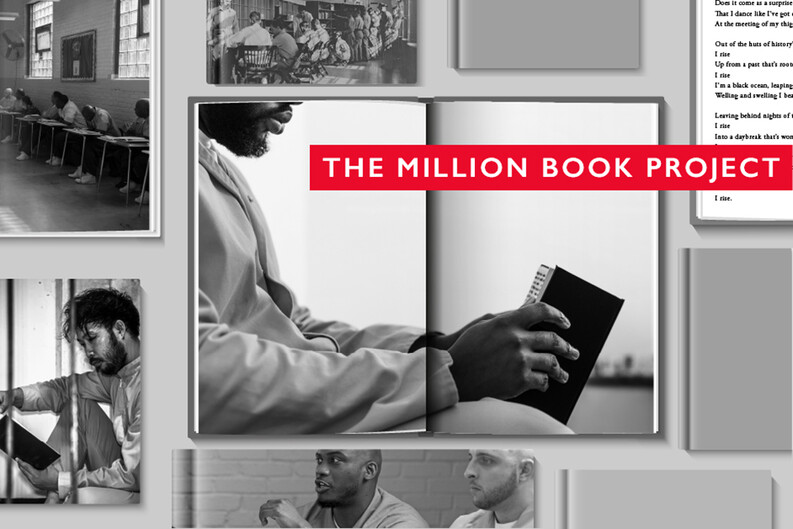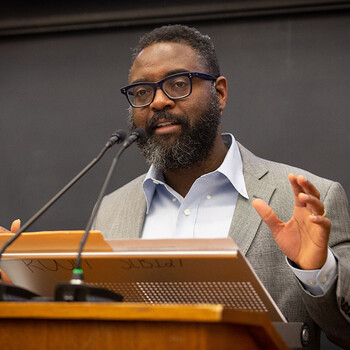Mellon Foundation, Justice Collaboratory Announce Million Book Project

The Andrew W. Mellon Foundation and Yale Law School’s Justice Collaboratory4 announced today a new initiative to distribute a curated 500-book collection to 1,000 medium and maximum security prisons, including at least one juvenile detention center, across every state in the United States over the next three and a half years. The Mellon Foundation’s $5.25 million grant will fund the Million Book Project, hosted at Yale Law School’s Justice Collaboratory, which aims to transform the role of literature and libraries in the lives of people in prison. This marks the first major grant since the announcement of the Foundation’s new strategic plan to increase philanthropic efforts for the arts and humanities through a distinct lens of social justice.

The Million Book Project, conceptualized by poet and legal scholar Reginald Dwayne Betts ’16 and brought to life through a joint partnership with Yale Law School’s Justice Collaboratory and support from the Mellon Foundation, will have two objectives: extending access to books — including poetry, literature, history, and social thought — across the prison system and creating opportunities for incarcerated people to interact with authors and the literary community.
The United States has the highest incarceration rate of any country on Earth, with overincarceration a cruel and unjust reality of the American penal system. Disproportionately, people of color bear the brunt of systemic inequities in our conception and application of the law. The Million Book Project creates a rhetorical and functional response to this specifically American fact, and offers the book as both a resource and a symbol of freedom, restoring hope, dignity, meaning and purpose to those incarcerated.
With Mellon’s support, the Million Book Project will produce a curated 500-book capsule collection, which will include poetry, literature, history and social thought, with significant representation of Black writers and thinkers whose work offers knowledge and analysis of society’s injustices, a diverse range of life stories, and visions of a more just society.
The Million Book Project will then place the collection in 1,000 prisons and juvenile detention centers across all 50 states, including Puerto Rico and Washington, D.C. The project will also recruit 52 writers and scholars to serve as project ambassadors for the project who will then participate in a nationwide reading series across the prison facilities. Additionally, artist Titus Kaphar will be commissioned to create a sculptural bookshelf that will be replicated and house the first set of 500 books; the sculpture will encourage viewers to imagine this literary collection inside a prison cell.
“Reading is a transformative, dignity-affirming act that reveals who we are to ourselves and strengthens our shared humanity. The knowledge, critical thinking, and imagination found in books enable us to envision freedom and possibility,” said Mellon Foundation President Elizabeth Alexander. “The Million Book Project is rightly the first grant we have made since the public announcement of our new strategic direction — one that even more firmly roots the Mellon Foundation’s work in social justice. Through the magnitude and vision of the Million Book Project, we affirm the right of those who are incarcerated to robust participation in the imaginative and intellectual life of American society, and we are determined to do our part to help rectify the systemic inequities that currently exclude them from that engagement.”
“My own experience as a formerly incarcerated individual has been distinctively shaped by the power of books,” said poet and legal scholar Reginald Dwayne Betts, who graduated with a J.D. from Yale Law School in 2016. “In books is where I found redemption, reading is where I found freedom, and writing is where I was able to express my individual thought, imagination and creativity. Through the Million Book Project, I hope each and every one of my incarcerated brothers and sisters will be able to find a newfound freedom and hope that only literature can bring.”
Betts is a Senior Research Scholar at the Arthur Liman Center for Public Interest Law5 at the Law School. In 2016–17, he was a Liman Fellow in the New Haven Public Defender’s Office.
Elizabeth Hinton, a professor of history, African-American studies and law at Yale, will be working with Betts on the project. The New York Times6 spoke to Betts and Hinton to discuss how they will curate the book selection.
The Million Book Project’s aim is to activate this initiative in each state at:
- all medium and maximum-security men’s state prison facilities
- all women’s state prison facilities
- at least one juvenile detention center
Through this grand project, the Mellon Foundation hopes to shift the conversation around incarcerated individuals and bolster the relationship between “outside” communities, the literary world, and the millions of human beings behind bars in this country.
About The Andrew W. Mellon Foundation
The Andrew W. Mellon Foundation is the nation’s largest supporter of the arts and humanities. Since 1969, the Foundation has been guided by its core belief that the humanities and arts are essential to human understanding. The Foundation believes that the arts and humanities are where we express our complex humanity, and that everyone deserves the beauty, transcendence, and freedom that can be found there. Through the Foundation's grants, it seeks to build just communities enriched by meaning and empowered by critical thinking, where ideas and imagination can thrive.
About the Justice Collaboratory
The Justice Collaboratory brings together an interdisciplinary group of scholars and researchers at Yale University and elsewhere to work on issues related to institutional reform and policy innovation and advancement. The Justice Collaboratory infuses theory and empirical research in order to make the components of criminal justice operation simultaneously more effective, just, and democratic.


